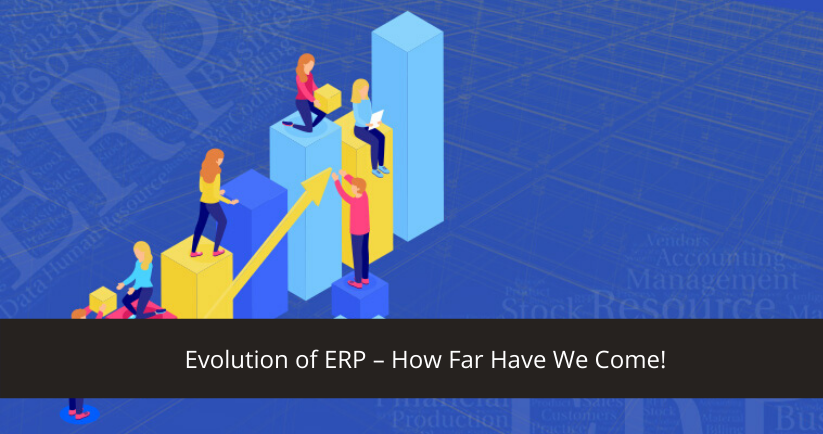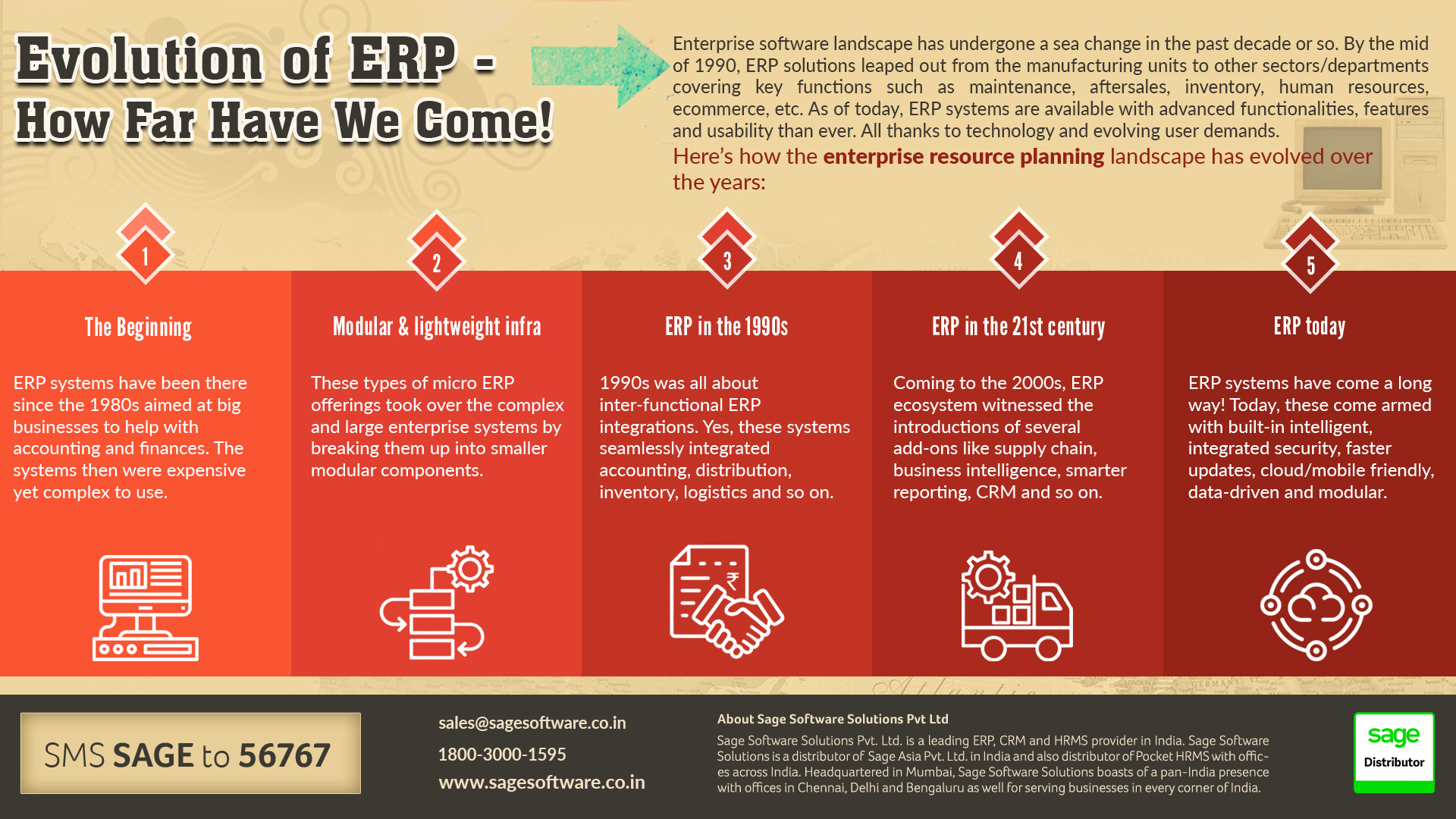Evolution of ERP
From the widespread adoption of social media to the evolution of mobile and cloud computing, the enterprise technology (IT) landscape particularly the enterprise software (ERP) ecosystem has witnessed a streak of technological advancements in the last couple of decades.
Read also: How Artificial Intelligence is shaking up the ERP Landscape?
Enterprise software landscape has undergone a sea change in the past decade or so. By the mid of 1990, ERP solutions leaped out from the manufacturing units to other sectors/departments covering key functions such as maintenance, aftersales, inventory, human resources, ecommerce, etc. As of today, ERP systems are available with advanced functionalities, features and usability than ever. All thanks to technology and evolving user demands.
Here’s a graphical representation on how the enterprise resource planning landscape has evolved over the years:
- The Beginning
ERP systems have been there since the 1980s aimed at big businesses to help with accounting and finances. The systems then were expensive yet complex to use.
- Modular and lightweight infra
These types of micro ERP offerings took over the complex and large enterprise systems by breaking them up into smaller modular components.
- ERP in the 1990s
1990s was all about inter-functional ERP integrations. Yes, these systems seamlessly integrated accounting, distribution, inventory, logistics and so on.
- ERP in the 21st century
Coming to the 2000s, ERP ecosystem witnessed the introductions of several add-ons like supply chain, business intelligence, smarter reporting, CRM and so on.
- ERP today
ERP systems have come a long way! Today, ERP systems come armed with built-in intelligent analytics capabilities, integrated security functionalities, faster updates, cloud focused/mobile friendly, data-driven and modular offering unmatched flexibility.
Read also: How Digital Transformation Is Changing the Way We Treat Enterprise Technology?
How ERP Can Build Better Business?
The difference between an average business house and an industry leader is that the former depends solely on humans or machines. On the other hand, the latter maintains a healthy balance between both. When human attributes – leadership, teamwork, and creativity – are coupled with the lightning speed and automaticity of ERP software, magic happens. This article talks about 4 ways how an ERP software can help you build a better business.
1. It provides better customer experience
Customer experience is no longer limited to the interaction between the client and the customer care agent. It has outgrown that definition. Now, it also includes brief conversations with a chatbot, access to FAQs on the website, and information exchanges via social media channels. An ERP software collaborates with different information channels and helps you achieve this easily.
2. It frees up resources
Do you still rely on your human workforce for quality checks at the factory, registering customer complaints, and following them up, preparing invoices and Bills of Materials (BOM)? If yes, then you should think about investing in ERP software. It will take care of mechanical functions thereby freeing up time for your workforce to focus on business-critical functions.
3. It enables collaborations
When the world is moving towards “remote working” and “Work from home” models, it has become imperative for companies operating across industries to employ a lag-free collaboration strategy. An ERP software integrates different collaboration tools such as video conferencing tools, messaging apps, and document sharing applications that help teams stay connected with each other over geographically dispersed locations.
4. It significantly improves accuracy and efficiency
The more efficient and accurate your processes are, the more will be your productivity. ERP Software can help you achieve this easily. It helps you make quarterly reports within minutes instead of weeks. It also cuts off lead times of major product cycles that allow companies to serve more number of clients effectively.
How ERP Can Help Businesses Succeed?
In the digital age that we live in, starting a business has become easy. You would be shell shocked if you compare today’s business environment – the time it takes to register, investment and resources required, and the web of mandatory compliance – with that of a few decades back. But the new age brings with itself new challenges that need to be solved. This article talks about 5 enterprise management tips that will help you attain insane success.
1. Enterprise management tips for having a properly structured business plan
A well-structured business plan is a must for any business. It helps you focus on your target audience and develop a clear brand messaging. It lets you distinguish between the best and worst possible scenarios. It allows you to set benchmarks, deadlines and monthly targets. Here are the 5 most important uses of a properly structured business plan.
- Helps build customer profiles
- Helps conduct thorough market research and analysis
- Helps formulate a pricing strategy
- Gives an elaborate view of your operating strategy
- Furnishes an executable finance strategy
2. Enterprise management tips for closing the deal
The advent of social media and other communication channels has caused the information to spread like wildfire. Thus, customers are well equipped to make better decisions. This has changed the rules of the game. It has increased customer expectations and made deal-closing a tough job. The following are 4 imperative things that sales agents must keep in mind while dealing with clients.
- Nurture relationships with the right customer
- Analyze the critical pain points of your customer
- Use case studies and stories to influence your customer
- Make a list of objections your customers may raise and study them thoroughly
3. Enterprise management tips for expanding your pipeline
The wide availability of product and price information, live demos, and reviews have made customers very well informed. This has rendered cold calling obsolete. This point elaborates on the 5 most important things that agents need to focus on to grow their pipeline.
- Find your specific market and ideal prospect
- Build your audience based on a set of market approved criteria
- Rely only on data from accurate sources
- Do a thorough analysis of your customer database before approaching them
- Formulate a territory strategy for your sales team
4. Enterprise management tips for breaking information silos
Information sharing is crucial for every organization. It helps speed up business activities, improves business intelligence and makes the company more agile. Information silos restrict this free flow of data and form information barriers. The following are 4 tips to demolish them.
- Build consensus to share vital information.
- Focus on building common targets for different departments.
- Conduct inter-departmental exercises and impart collaborative training
- Eliminate technical glitches by implementing the right collaboration tools to share data
5. Enterprise management tips for cementing better relations with your customers
An array of research provides ample evidence that finding new customers is way more expensive than retaining existing customers. The following 4 points illustrate how modern-day enterprise technology – such as a CRM system – helps convert prospects into loyal customers.
- Access customer data within a few seconds
- Allow customers to post questions on a real-time basis
- Resolve customer queries through various channels including voice calls, live chat, social media, etc.
- Enables customers to provide recommendations, post reviews, and meet with other customers.
Takeaway
The evolution of ERP has been traversing at rocket speed. And as the evolution doesn’t seem to cease either, ERP systems are robust and well-equipped today than they were a decade ago. In fact, there are exciting times ahead for ERP software landscape with Big Data and IoT coming together to create more powerful and intelligent ERP systems.
ERP systems today no longer feel and look dizzy and are appealing than ever. They are way more advanced, cloud based delivered via SaaS (Software-as-a-Service) model. They are much flexible and modular in nature thus, making them a perfect pick-me-up for small businesses. For instance, ERP system like Sage 300cloud is not only helping businesses streamline their key functions, but also helping them be more agile and efficient.
Contact us now for a FREE demo. You can also drop a mail at sales@sagesoftware.co.in
Disclaimer: All the information, views and opinions expressed in this blog are those of the authors and their respective web sources and in no way reflect the principles, views or objectives of Sage Software Solutions (P) Ltd.
Sources: Forbes, The Answer Co, CMS Wire, Ajbubb, Balloon One, e2btek, SlideShare.





